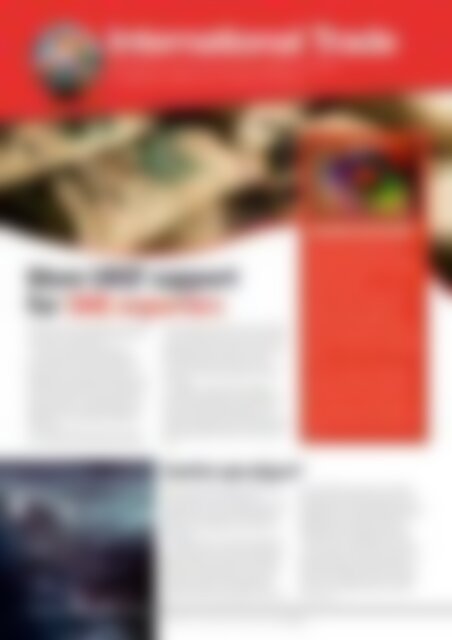Credit Management January February 2024
The CICM magazine for consumer and commercial credit professionals
The CICM magazine for consumer and commercial credit professionals
Create successful ePaper yourself
Turn your PDF publications into a flip-book with our unique Google optimized e-Paper software.
International Trade<br />
Monthly round-up of the latest stories<br />
in global trade by Andrea Kirkby.<br />
More UKEF support<br />
for SME exporters<br />
UK Export Finance (UKEF) has announced<br />
new measures to help SME exporters to<br />
access more opportunities.<br />
In doing so, UKEF has expanded<br />
its ‘auto-inclusion’ scheme that gives<br />
businesses fast-track access to finance<br />
products such as the General Export<br />
Facility which provides partial guarantees<br />
to banks to help UK exporters with trade<br />
finance facilities. There are two facility<br />
types supported – cash facilities such as<br />
trade loans, and contingent obligation<br />
facilities such as bonding and letter of<br />
credit lines.<br />
As a result, SME exporters should be<br />
able to get Government-backed support<br />
faster without intervention from the UKEF.<br />
At the same time, the maximum support<br />
UKEF can offer under auto-inclusion has<br />
doubled from £5m to £10m. Loans under<br />
the General Export Facility have also<br />
increased from two to five years which<br />
means more flexible repayment terms if<br />
required.<br />
In addition, an agreement between<br />
the UKEF and HSBC India may help SMEs<br />
export to that market. A Letter of Intent<br />
under the UKEF’s Standard Buyer Loan<br />
Guarantee programme could involve up to<br />
£100m in potential loans for Indian buyers<br />
purchasing goods and services from UK<br />
firms.<br />
WORKING FROM HOME<br />
AS if we need to be told. Sales of<br />
beauty products and make-up are<br />
soaring in the working-from-home era<br />
as people spend more time looking at<br />
themselves on video calls – so says a<br />
report in The Times.<br />
Beauty retailer Space NK reckons<br />
that ‘Zoom boom’ has led to a 39<br />
percent increase in make-up sales<br />
in the six months to the end of<br />
September. Andy Lightfoot, CEO of<br />
the company, has said that “when you<br />
are in a meeting room, you can’t see<br />
yourself… “but Zoom has made people<br />
a lot more conscious about how they<br />
look.”<br />
Working from home has also led<br />
to a rise in multiple contract working<br />
– where an employee misleadingly<br />
holds down two or more jobs at the<br />
same time. Even so, the point is very<br />
clear – exporters involved in beauty<br />
and grooming products might want to<br />
tweak their advertising to attract the<br />
self-conscious buyer that works from<br />
home.<br />
Zombie apocalypse?<br />
THE Financial Times recently commented<br />
on the rising risk of zombie firms –<br />
businesses that can just about service their<br />
debts but do no more. It said that after a<br />
decade of ‘rock-bottom’ interest rates, a<br />
wave of creative destruction may be no<br />
bad thing.<br />
It appears that corporate bankruptcies<br />
in the US are due to hit their highest level<br />
since 2010; they are surging in England,<br />
Wales and the eurozone, too. This is set<br />
to continue as businesses are forced to<br />
refinance on higher rates, as bills rise,<br />
and demand slows. The reality is that<br />
many would have already gone to the wall<br />
without COVID-era support. Most grew<br />
because of low interest rates, but ‘sap’<br />
productivity by ‘lowering investment and<br />
employment for more efficient businesses’.<br />
Regardless, the collapse of weak firms<br />
could spread to those that are more<br />
efficient which ‘would be problematic’.<br />
While it’s up to regulators to monitor<br />
private markets, and insolvency services<br />
to ensure firms can ‘fail well, and fast’, it’s<br />
imperative that businesses are alive to<br />
the financial health of not only who they<br />
sell to but also those within their supply<br />
chain – an unexpected failure could be<br />
problematic.<br />
Brave | Curious | Resilient / www.cicm.com / <strong>January</strong> & <strong>February</strong> <strong>2024</strong> / PAGE 44

















